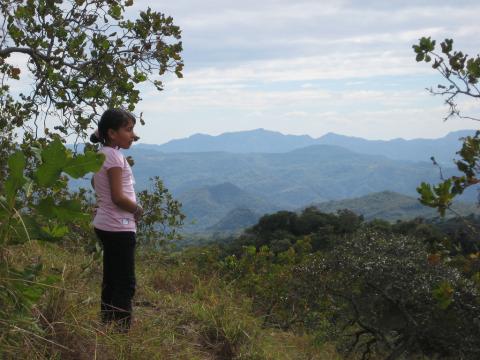
“Epiphany is the manifestation of the poor,” Argentine-Mexican philosopher Enrique Dussel said to my classmates and me more than twenty years ago. I still think about that – a lot. Each year I try to deepen this double mystery, the revelation of Christ and the poor, to give new avidity to Enrique’s poignant statement.
For the last few years, I’ve been doing this reflection from El Salvador, where a large part of the population is in a constant state of migration to find work or escape violence, or both.
January is the dry season here and in a small dusty courtyard, a family is waiting to hear news from their father, Eduardo. Eduardo had decided to risk his life and cross through Guatemala and Mexico to search for a job in the United States. I know Eduardo and his family well. He and his wife have five children. A few days after Eduardo leaves for the States, I visit the family.
After I knock on the low front gate, Reina, Eduardo’s wife, motions for me to come in. She is in her mid-fifties but looks much older. Her Afro-Salvadoran hair is gray and stacked in a bun. Her high cheek bones are pointed; her eyes are drops from a dark night. On the leeward side of the courtyard is the main shanty. The adobe walls are smooth and the mud is a dark color.
Next to the house are two more structures where the four older children live. Across from these mud huts, on the windy side of the courtyard, is a kitchen and an outhouse. The adobe is pale here, weather-beaten, and badly cracked.
In the center of the courtyard is a handmade, wooden table. Eduardo’s guitar is resting on it. Besides working as a handyman, he is a musician and sometimes plays with a mariachi band in San Salvador. Spread around the guitar are Eduardo’s mariachi uniform-- brass studded charro pants (traditional Mexican horsemen’s pants), a red scarf, a wide-brimmed sombrero hat, and a black jacket with a beautiful red heart embroidered between the shoulders.
“We put his uniform out to remember him, to keep him in our prayers,” Reina said.
Six-year-old Damaris, the youngest daughter, stands before the jacket and traces her finger over the red threads. Her yellow calico dress is worn thin but clean – obviously a hand-me- down. Her face is covered with sores and her nose is running due to a cold, but I can see the soul of the father she loves beaming through her eyes.
Damaris makes her way around the table and picks up the red scarf, puts it to her nose, and inhales her father's scent. She reaches out and plucks the low E string on the guitar. It must hum ‘new dress’ to her ears. That’s what Damaris says her father is going to bring her.
Once again she inhales through the scarf, then she picks up the sombrero, and puts it on. It falls to her chin. With her face shielded, she can hide her emotions and she begins to cry. Her mother and older sister try to comfort her. They take the hat off Damaris and find her misted over. Tears run down her cheeks at the speed of falling stars. “Quiero mi papá. Quiero mi papa" ("I want my father. I want my father."), she weeps to no one in particular.
Witnessing Damaris’ grief gives me new insights into the Epiphany of the Lord. First, the star that guided the Magi has become a human face, with a history, and thus the Magi’s – and my – search is first and foremost an active and contemplative search, a sharing of life with the poor.
The Magi and I find ourselves asking: What gives me the right to live a better life than this fragile waiting child?
Not finding an answer, the Magi dropped to their knees and did homage to the child Jesus. Now I do homage to Damaris with the gift of my presence and being, which have become a yearning for truth and justice. This invaded our lives to such an extent that the meaning of home now takes on the meaning of spirit and unity. The Magi could do nothing but let go of their gold, frankincense and myrrh – and I, a bit of my own security – for we have discovered the God of the poor and become children of this God.
